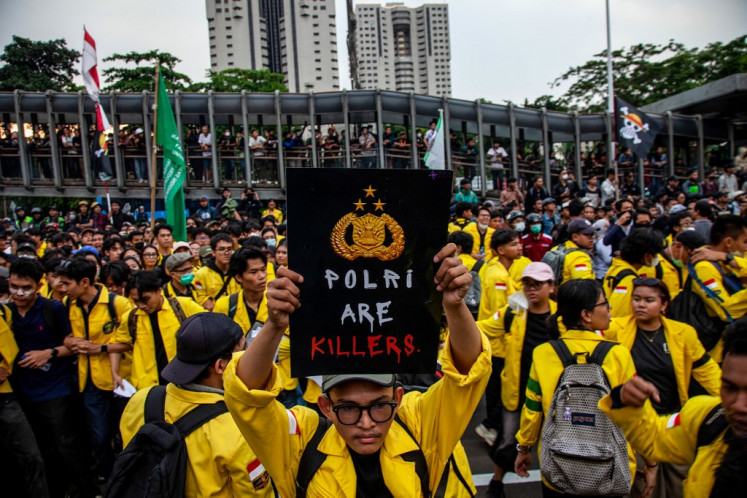Popular Reads
Top Results
Can't find what you're looking for?
View all search resultsPopular Reads
Top Results
Can't find what you're looking for?
View all search resultsBetter policies needed to improve road safety: Experts
As traffic violations continue to be commonplace on Jakarta’s streets, transportation experts argue that stricter regulations and better road infrastructure are needed to improve traffic behavior and ensure road safety
Change text size
Gift Premium Articles
to Anyone
A
s traffic violations continue to be commonplace on Jakarta’s streets, transportation experts argue that stricter regulations and better road infrastructure are needed to improve traffic behavior and ensure road safety.
“Transportation is about civilization. The way to create a civilized society is through, among many other things, policies that are obeyed by the people,” Indonesian Transportation Society (MTI) chairman Agus Taufik Mulyono said in a discussion on Thursday held to commemorate World Day of Remembrance for Road Traffic Victims observed every Nov. 17.
“When road users are used to following traffic rules and respecting each other, and at the same time there are infrastructure improvements that better ensure everyone’s safety, we can definitely reduce the risk of traffic accidents,” he added.
From 2012 to 2016, according to Statistics Indonesia (BPS), there were on average 6,600 traffic accidents every year in the capital. Roughly 700 people died each year and thousands of others were injured.
Institute for Transportation Development (ITDP) Indonesia transportation associate Aishah Imran echoed the sentiment, saying the challenges in managing traffic continued to escalate because any efforts made often rubbed up against the growing number of road users and technological advances that support urban commuting.
“The city must be flexible to accommodate technological advances in regard to public vehicles. Recently we’ve seen the rising trend of micro mobility vehicles, such as electric scooters, hoverboards or electric unicycles,” Aishah said.
She said the government should be able to come up with solutions that took the side of the public interest.
“If the vehicle is deemed unsafe, then standardize the fleet specifications. If the infrastructure is not ready, then improve it. Banning them all at once will not be effective in preventing traffic incidents from happening in the future,” the ITDP Indonesia expert added.
Aishah referred to a recent traffic accident involving an electric scooter and a car in which two scooter users died.
The incident, which took place outside the Gelora Bung Karno (GBK) sports complex earlier this month, sparked debate about the use of electric scooters in the capital.
While the electric scooter rental provider Grab Indonesia claimed that its scooters were aimed at supporting urban and green mobility, many have instead used the scooter for recreational purposes.
To avoid similar incidents, the Jakarta Police decided to fine users of electric scooters on roads and bicycle lanes outside areas designated for micro mobility vehicles. The fine could be up to Rp 250,000 (US$17.69).
The Jakarta administration, through its transportation agency, is also preparing a gubernatorial decree that will regulate the use of scooters in which the city reportedly will allow users of electric scooters and the like on bicycle lanes.
Transportation expert Deddy Herlambang called on the city administration to stop being reactive and start planning things ahead to anticipate changes.
“How come we ban scooters from sidewalks and footbridges, but turn a blind eye knowing that we let bicycles cross footbridges. Even motorcycles sometimes get on sidewalks. We should be fair,” he said.
Deddy went on to mention that pedestrians, particularly those from vulnerable groups like the disabled and seniors, are among the road users whose safety should matter the most.
The discussion also further brought up how railway crossings contributed to traffic accidents.
The South Jakarta Transportation Agency closed a railway crossing in front of the Institute of Social and Political Science (IISIP) campus in Lenteng Agung, South Jakarta, on Nov. 16.
The crossing, over a railway line connecting Jakarta with Depok and Bogor in West Java, was situated at a U-turn into which hundreds of vehicles used to cram during rush hour.
The city administration is currently constructing an overpass for motorized vehicles in order to tackle clogged traffic and to ensure safety.
Among the latest traffic accidents on railway crossings was one in Tangerang, Banten, on May 11 that left four people dead and four others injured.
There are still a large number of poorly supervised railway crossings in Greater Jakarta.
Of around 450 railway crossings in the area, which is under state-owned railway company PT Kereta Api Indonesia’s (KAI) operational area 1, only 170 are official crossings and supervised by KAI, local administrations or the private sector. The remainder are supervised unofficially by local residents.
As activists keep calling on the government for better policies, cofounder of the Discussion Forum for Jakarta Transportation (FDTJ) Yusa Cahya Permana said the biggest responsibility lay in the hands of road users themselves.
“Do you realize that we mostly learn about road safety and traffic rules through a self-taught process? Basic knowledge of traffic rules are never taught officially,” he said, pointing to rules like where to stop at traffic lights and the etiquette before making a turn.
Yusa also cited other skills such as how to avoid a car’s blind spot, how to determine properly the speed of approaching trains and how to assess distance when overtaking large vehicles.
“When we talk about traffic accidents, we often talk about the statistics, like the number of accidents and the victims, as if those are what matter the most. We should instead discuss the causes and how to prevent losing more lives from such incidents,” the FDTJ expert added.

















